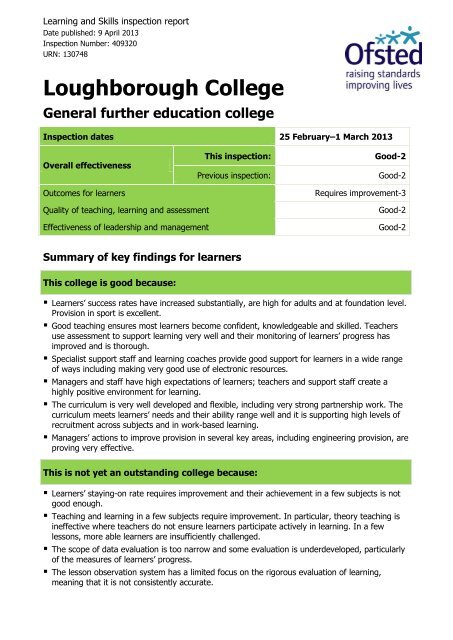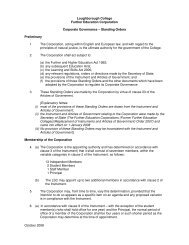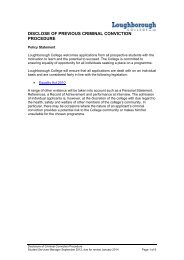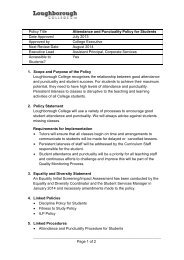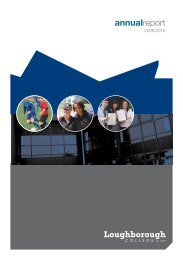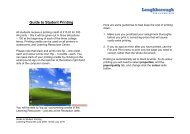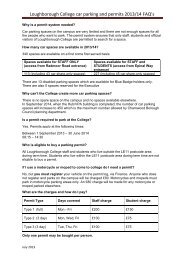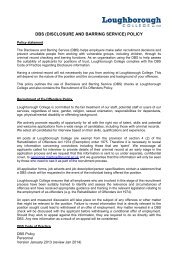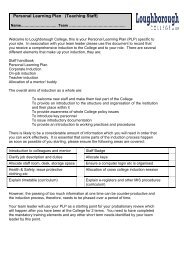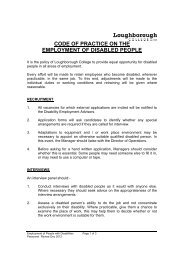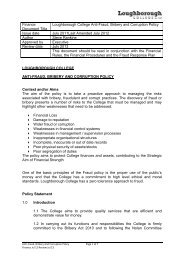Ofsted Inspection Report.pdf - College Documents - Loughborough ...
Ofsted Inspection Report.pdf - College Documents - Loughborough ...
Ofsted Inspection Report.pdf - College Documents - Loughborough ...
Create successful ePaper yourself
Turn your PDF publications into a flip-book with our unique Google optimized e-Paper software.
<strong>Inspection</strong> report: <strong>Loughborough</strong> <strong>College</strong>, 25 February–1 March 2013 3 of 18they make much better progress and exceed expectations. At other levels of study, learnersmostly make at least satisfactory progress and develop good vocational skills.• Work-based apprentices’ achievement varies depending on subject they study. Overall, theirframework success rates have increased and these are just above average; most of theapprentices who succeed do so within the time allowed. However, while apprentices’ successrates are high in sport, they are low in engineering and customer service. Other workplacelearners achieve with higher success rates than in similar colleges.• A high number of learners are successful in functional skill qualifications at foundation level butthe much smaller number who study at intermediate level underachieve. Achievement of highgrades in GCSE English and mathematics is above average for the relatively small numbers oflearners who resit these qualifications. In the majority of subject areas, learners achieve usefuladditional qualifications, such as coaching awards or specialist health care certificates, whichsupport them in gaining employment.• The extent to which learners make progress through levels of study is difficult to measureaccurately because managers’ analysis is insufficiently detailed. In addition, because rigorouscollection of data about learners’ destinations has only just begun, accurate measurement oflearners’ destinations is limited. However, data held at curriculum level indicate high levels oflearners’ internal progression and their destinations into higher education or employment in afew subjects.• Male and female learners achieve at a broadly similar rate except on apprenticeships where theextent to which female apprentices outperform males is increasing. Wide gaps between thesuccess rates of adults of Asian Indian, Bangladeshi and White Other heritage and whole collegesuccess rates closed in 2011/12. Learners with learning difficulties and/or disabilities succeed atleast as well as their peers.The quality of teaching, learning and assessmentGood• Teaching, the use of assessment and, in particular, monitoring of learners’ progress improved in2011/12, as shown by the marked increase in success rates. Teachers ensure that a largemajority of learning activities are good. In sport, teachers often teach excellent lessons andlearners receive at least a few outstanding lessons in most other subjects. Teachers’ highexpectations of learners are a significant feature of good or better lessons, which inspires,motivates and helps them to be professional and mature in their attitudes.• In the large majority of subjects, teachers are vocational specialists. They often bring learningalive by using realistic tasks, for example by learners undertaking responsible serving roles inthe restaurant or dealing directly with clients in hairdressing salons. This well-managedapproach helps learners develop confidence.• Teachers’ use of detailed and well-staged demonstrations, their explanations of important pointsand their linkage of theory and practical are frequently highly effective. Combined with thesestrategies, teachers often check that learners’ knowledge is secure and consolidated. They use agood variety of activities, such as group and paired work, to engage learners productively inlessons, often well matched to ability.• In a few subjects, teachers do too much of the work and allow a slow pace. Their structuring oflessons is not careful enough to keep learners involved or to be certain that learners are makingadequate progress. Learners do not always grasp the key points fully due to teachers’explanations being insufficiently effective.• Teachers’ challenge to learners is often high. For example, teachers expect sports studieslearners to aim for competition experience, beauty teachers require a high level of creativity,such as in nail art, as well as practical competence. However, in a few theory lessons, more able
<strong>Inspection</strong> report: <strong>Loughborough</strong> <strong>College</strong>, 25 February–1 March 2013 5 of 18experience of the care sector to provide stimulating and varied learning, which develop learners’knowledge and skills securely.• Teachers develop learners’ understanding and their attitudes towards working closely with oftenvulnerable people very well. This includes supporting learners to be successful in a wide rangeof additional qualifications, such as in mental health awareness. Teachers and learners regularlywork closely to set and monitor challenging short and long-term targets, which improve thempersonally, socially and academically.• Teachers plan learning well to meet learners’ individual needs using a wide range of interactivestrategies, outside speakers and educational visits, for example a trip to a Forest School.Learners enjoy and learn well from highly active learning tasks particularly working withdifferent people in small group-work. Teachers check learning regularly and they encourage selfassessmentand reflective learning.• Teachers make good use of regular work experience to improve learners’ studies. They explorework scenarios and link these well to lesson topics. Teachers link theory to practice verycoherently. They make sure that learners, particularly more able, are challenged to research,think deeply and fully justify their findings including identifying any implications for professionalpractice.• Advanced level health and social care learners respond well to challenging case studies,illustrating the above point. For example, they researched the roles and responsibilities ofchildcare professionals in a safeguarding context and held a mock case conference for acomplex and sensitive situation. Learners worked maturely and they identified the factsobjectively including how to offer the family support.• Assessment is accurate, well planned and timely. Teachers set appropriately challengingassignments. Learners value the very detailed verbal feedback they receive, but writtenfeedback does not always contain sufficient information to assist learners to reflect on what theyhave done well. Teachers do not consistently correct spelling and grammar.• Learners’ work is good and often uses appropriate academic language. Teachers promotelearners’ confident use of information and learning technology and their good research andproblem solving skills well. Learners reference their work and use a bibliography correctly.However, they do not always record the date on which they accessed a website.• Teachers develop learners’ English skills well. Learners prepare and present visual informationwell including in a range of formats to meet the audience needs. Teachers developmathematical skills less widely, but adequately, for example by calculating percentages tounderstand the findings of a research project more fully.• Staff provide very good personal and academic support for learners. Learning support assistantswork effectively with teachers. Staff have close partnerships with parents and carers, whichensures that the resolving of issues is quick and effective. Good working relationships exist withwider college support arrangements and with employers and local schools.• A high number of learners progress to relevant employment, but far fewer progress to the nextlevel of study. Progression to higher education is highest for health and social care learners, butis not yet a strong feature.• Staff promote equality, diversity and safeguarding very well. Teachers’ good learning resourcesand their attitudes reinforce the importance of respect and the need to value individualdifferences. Teachers are positive role models ensuring learners’ work reflects a diverse society.Learners feel safe and adopt safe working practices consistently.
<strong>Inspection</strong> report: <strong>Loughborough</strong> <strong>College</strong>, 25 February–1 March 2013 6 of 18Engineering and motor vehicleLearning programmes for 16-18Learning programmes for 19+Requires improvement• While practical teaching is mostly good, too much theory teaching requires improvement andsupport arrangements have not been sufficiently effective in retaining learners. This is reflectedin the previously low long course success rates, which are mainly due to too few learnerscompleting their courses. Considerable progress has taken place in improving support andguidance and in-year retention rates are high. Progression rates between levels of study areincreasing.• Teaching and learning are good in practical workshop lessons. Teachers organise these sessionswell and learners work safely and diligently. Accordingly, they make good progress and developgood vocational skills. Teachers provide a good range of opportunities for learners to developwider skills, but there remains scope to link workshop activity more closely to developing theoryand wider skills.• Learners’ progress in theory lessons varies too much because of uneven quality in teaching. Inthe minority of better lessons, teachers make good use of modern technology, such as circuitsimulation software, questioning and a variety of activities and extension exercises. Theirstrategies engage and sustain learners’ interest and they respond well.• In a minority of theory lessons staff do not organise teaching well. For example, too muchteaching is repetitive, the pace of learning is slow and those who learn quickly have insufficientchallenge. Teachers’ management of group work and plenary sessions to assess what learninghas taken place is ineffective.• Recent curriculum development has improved learners’ motivation and interest. This includesinnovation such as the use of tablet applications in motor sports engineering. Shorter blocks ofwork in the motor vehicle curriculum have improved course structure and enable clearerprogress monitoring. Teachers work well with employers to enhance the curriculum. Forexample, employers contribute well as guest speakers.• Arrangements to recruit learners are satisfactory. Managers have recently revised the criteria forentry and staff apply these rigorously in order to give learners the best chance of success. Initialadvice and guidance are more systematic than previously. Staff initially assess learners’ literacyand numeracy skills thoroughly and support arrangements for those learners who need extrahelp are effective.• Teachers use assessment well for most learners, but not for those on engineering courses,where it is adequate. Across subjects, written work is not marked and returned consistentlypromptly and the usefulness of written feedback varies in quality. However, learners’ work isoften of a high standard. Teachers ensure learners collate their notes well in electro-technologybut not so in engineering and in a few lessons note taking is insufficient.• Specialist workshop resources are good and excellent in a minority of areas such as electrotechnology.Classrooms are well equipped with information and learning technology. A fewtheory lessons take place, inappropriately, in computer rooms and a minority of practicalelectronics lessons takes place in unsuitable general classrooms.• Recently individual learners’ progress reviews have improved, particularly through the work oflearning coaches. However, the use of targets generally, particularly minimum target grades topromote progress, is underdeveloped. Teachers’ use of constructive catch-up sessions forlearners is at an early stage.
<strong>Inspection</strong> report: <strong>Loughborough</strong> <strong>College</strong>, 25 February–1 March 2013 7 of 18• Teachers’ role in the development of English skills is a recent priority and arrangements aresatisfactory. Learners’ work is marked appropriately for grammar and spelling and teachersprovide adequate feedback. Teachers develop learners’ mathematical skills well.• Teachers promote equality and diversity satisfactorily. Group tutorials cover equality anddiversity matters adequately. Schemes of work prompt consideration of these matters and, in afew lessons teachers give specific attention to topics such as how barriers to engagement, suchas disability, are overcome.Sports studiesLearning programmes for 16-18Learning programmes for 19+Outstanding• Excellent teaching supports learners in achieving high success rates on academic and vocationalcourses and the development of their very good sports and coaching skills. Highly motivatedteachers are aspirational role models and have very high expectations of learners. Learnersrespond keenly and with enjoyment. Their behaviour and attitudes to learning are exemplary.• In most lessons, teachers plan and manage highly effective and often inspirational learningensuring learners’ full engagement and quick progress. Teachers draw on their expertprofessional practice, setting imaginative and challenging activities that meet learners’ individualneeds and abilities. In a very few lessons, teachers allow learners to rely on them too much andnot think for themselves.• Teachers and learners maximise the opportunities to develop excellent practical andemployability skills through use of a wide range of very high standard fitness, coaching andsports science resources. Practical lessons inspire learners and often integrate theory veryeffectively. For example, foundation and intermediate level learners undertake complex sportscience fitness testing exercises, deepening their understanding of the effects of exerciseincluding on their personal health.• Teachers use technology very effectively to promote learners’ independent study. Learners usethe high quality learning materials and links to further learning and research available on‘LearnZone’ extensively.• Teachers’ monitoring of learners’ progress in lessons is excellent. They use continuousassessment particularly well to check and develop learners’ understanding. Learners offeranswers frequently during directed questioning, learn well from each other and often undertakepeer and self-assessment.• In lessons, teachers often develop learners’ mathematical skills and English well through sportrelatedactivities. For example, learners developed their numeracy skills through analysis of dataabout Manchester United’s international fans followed by a discussion of the importance of usingmathematical skills in the sports industry.• Assessment is excellent; assignments are interesting and varied. Teachers’ feedback helpslearners develop their skills particularly well and consistently highlights inaccuracies in spellingand grammar. Learners use teachers’ comments very productively to improve their work.Teachers regularly set and review challenging targets for learners. This ensures they make swiftand often exceptional progress and frequently exceed expectations compared to their priorattainment.• Highly effective measures are in place to support learners at risk of underachievement.Specialist learning support tutors identify individual learners’ particular weaknesses, makethorough plans to support their improvement and work closely with teachers. Learners value thishelp and find it highly constructive and motivational.
<strong>Inspection</strong> report: <strong>Loughborough</strong> <strong>College</strong>, 25 February–1 March 2013 8 of 18• Learners benefit from highly valuable links with employers as well as the extensive partnershipsthat exist. A large majority of learners extend their leadership skills and experience of workingwith diverse groups through the <strong>Loughborough</strong> ‘Flames’ project that promotes fun and physicalactivity through the Olympic and Paralympic values in schools and local community venues.• Staff provide excellent advice, guidance and support ensuring learners choose the right courseto realise their ambition. Individual learners’ needs are quickly identified during a thoroughinduction and appropriate support provided promptly. During tutorials and review weeks,learners receive timely information and skills training which develops attributes that employersvalue and supports learners’ successful progression.• Teachers sensitively and thoroughly promote equality and diversity alongside having highexpectations of learners’ behaviour and respect for others. For example, learners consider thepsychological impact of profoundly debilitating injuries on elite athletes and the impact this hason their future lives. Many learners take part in activities with a diverse range of groupsincluding coaching Boccia and work with learners with learning difficulties and/or disabilities,religious faith groups and older clients with particular exercise and fitness needs.SportApprenticeshipsOther work based learningOutstanding• Trainers use highly effective teaching methods very well to inspire and challenge work-basedlearners, ensuring that most make rapid progress as well as improving their skills andunderstanding to a high level. This results in their improved and very high apprenticeshipsuccess rates. In addition, most work-based learners complete their course within the timeallocated.• Trainers rigorously apply complex theory to practice which helps develop learners’ analyticalskills as well as helping them make excellent progress in sports performance including rugby,netball and volleyball. For example, advanced apprentices are able to explain clearly andaccurately how carbohydrates contribute to performance energy requirements followingreflection on their weekly food diary and their teacher’s very good use of challengingquestioning to reinforce understanding.• Trainers make excellent use of their expertise including in inspiring learners to progress intosport-related employment and higher education courses. Most trainers come from elite sportingbackgrounds and command considerable respect from learners. They use their expertise verywell to explain complex physiological and psychological concepts. For example, in helpinglearners to understand how to control and use aggression constructively in rugby leaguematches.• Trainers make very good use of high quality resources for off-the-job training. Work-basedlearners make full use of the excellent college based facilities, including a very well equippedsports laboratory and gymnasium. In addition, good collaboration with Gateshead <strong>College</strong>ensures that learners have access to high quality resources including excellent indoor sportsfacilities. In addition, training is well organised at various venues across the country according tolearners’ home base.• Trainers, learners and assessors use information and learning technology well to prepare forworkshops and reviews. Learners use information held on ‘LearnZone’ well to reinforce theirunderstanding such as factors affecting performance. However, trainers’ development andpromotion of electronic resources are not fully comprehensive including meeting the needs ofthe broad range of elite athletes.
<strong>Inspection</strong> report: <strong>Loughborough</strong> <strong>College</strong>, 25 February–1 March 2013 9 of 18• Learners receive excellent and well-planned progress reviews, which ensure their fullcontribution. For example, through a tutor-led thorough one-to-one discussion, a trainee schoolbasedcoach accurately identified the significant progress made in developing pupil-behaviourmanagement skills by linking theoretical work with practical coaching experiences.• Teachers and learners agree highly effective specific, measureable and achievable targets in asupportive learning environment. Apprentices use these challenging targets to improve sportsperformance well. For example, an apprentice who successfully met a specific target based onimproving volleyball skills has recently been assessed by a national volleyball team scout.• Trainers’ excellent feedback, both written and verbal, enables most learners to improve theirskills and knowledge of sports performance and coaching rapidly. For example, rugby leagueapprentices use feedback on their nutrition productively to adjust their food intake. Trainerscorrect written work and provide good feedback, which mostly supports learners well indeveloping their functional skills.• Trainers promote equality and diversity strongly including discussions and probing questioningabout relevant issues in sport, such as the relationship between ethnicity and ability. Thisapproach supports learners in understanding difference, for example, in the needs of differentminority ethnic groups of primary school pupils.• Staff provide excellent information, advice and guidance which supports learning well. Acomprehensive induction course enable learners to settle in quickly and most remain on theirchosen course. Learners are rightly very satisfied with their courses. Staff support learners verywell to progress towards their learning goals. In 2012, the large majority of apprentices went touniversity to study sports-related courses and, similarly, learners training as coaches foundemployment as sports coaches.Foundation English and ESOLLearning programmes for 16-18Learning programmes for 19+Good• Good teaching is reflected in learners’ increased and often above average success rates atfoundation level in English and ESOL and their achievement of an above average proportion ofgood passes in GCSE English. However, teaching of functional skills at intermediate level for thesmall number who take these qualifications has not had the same impact as learnersunderachieve.• Learners are punctual and their attendance is generally good. Learners develop and improvetheir language skills well in preparation for employment, further or higher education as well asfor personal and social purposes. For example, learners practise writing reports including clearlyidentifying advantages and disadvantages of different products and they become skilled atwriting good quality and grammatically correct descriptive text for illustrative purposes.• Teachers are highly skilled and use their well-developed expertise to plan interesting learning fora range of ability levels and needs. They use specific learning objectives and individualisedtargets well to develop learners’ literacy and communication skills. For example, ESOL learnersimprove their pronunciation skills by precisely identifying and using different vowel sounds andGCSE English learners develop their use of similes and metaphors very well.• Teachers prepare very helpful profiles of learners and make good use of use records of theirspecific learning needs to update schemes of work. All learners make at least satisfactoryprogress and most make good progress in learning.• Teachers use a good range of motivating learning activities supported well by resources. Theyuse technology very effectively to present pictorial images clearly, promote analysis of differentforms of media and encourage learners to listen to narratives and music. These strategies help
<strong>Inspection</strong> report: <strong>Loughborough</strong> <strong>College</strong>, 25 February–1 March 2013 10 of 18develop learners’ contributions to discussions and as a stimulating basis for some of theircreative writing.• Teachers ensure lessons are well paced. They consistently challenge and extend learners toachieve their personal targets. Teachers place much good and sharply focused attention onimproving learners’ spelling of day-to-day vocabulary that relates to learners’ main study andinterests. However, in a few lessons, teachers’ attention to developing learners’ handwriting isminimal and a few become too reliant on word processing using a computer.• Most learners benefit from teachers’ regular and effective assessment. Teachers provide plentyof feedback and encourage peer assessment, for example as part of summaries of work at theend of lessons to aid the identification of strengths and weaknesses. However, in a few lessons,passive and less confident learners’ work is insufficiently assessed, mostly because teachers’questions to not include to all learners.• Information, advice and guidance are good. Specialist teachers are fully involved in assessingand analysing learners’ starting points in English. In addition to using creative writing tasks atinterview and induction, teachers use very successful practical and project activities to ensurelearners are on the appropriate courses and understand the demands of these. However, thelink between the findings from initial and diagnostic assessment and setting of individual targetsto monitor progress is not consistently strong.• Staff provide good and intensive individual support. Specialist English teachers use feedbackfrom subject teachers well to help improve learners’ performance. However, learning supportassistants and teachers do not always work closely enough to ensure that the support offered inclass is maximised, in part because their role is often not included in planning.• Teachers ensure that their choice of lesson topics and materials promotes discussion of equalityand diversity matters well. For example, ESOL learners discuss cultural and religious differences.Teachers challenge barriers to learning well to promote equality, for example throughsuccessfully promoting a reading club targeted at reluctant readers.Business studiesLearning programmes for 16-18Learning programmes for 19+Requires improvement• The quality of teaching and learning varies too much, a minority is good, but much teachingrequires improvement, particularly in accounting and law. This links with the range of successrates across the subjects, some of which are high, as in AS- and A-level business, and somewhich are low as on most accounting courses. Learners’ retention rates are increasing andprogression between AS and A-level is high.• Most learners are highly motivated and are enthusiastic about their courses. Their attitudes towork are good both in class and during independent study. Teachers mostly have very goodbusiness knowledge.• In the minority of better lessons, teachers use lively learning activities, which encouragelearners to work productively. In particular, business and law teachers make regular use of realindustry-based scenarios to help learners understand different aspects of topics. Most learners inthese lessons develop good skills and useful and relevant knowledge. For example, in law,learners evaluate funding sources and their accessibility for legal advice or representation. Inbusiness, learners explore and discuss a range of political factors and analyse the impact ofthese on a range of businesses.• Teachers over-direct too many lessons, particularly on accountancy courses. In these lessons,learners make too little contribution and often fail to extend their learning through discussion
<strong>Inspection</strong> report: <strong>Loughborough</strong> <strong>College</strong>, 25 February–1 March 2013 11 of 18and debate. Teachers give instructions and often provide the answers to questions withoutallowing learners to develop their own thinking.• Teachers do not adjust their approach to match learners’ abilities, particularly more ablelearners, frequently enough. Learners often work on the same basic task at the same pace withtoo little challenge for the more able. For example, business learners worked on completing costforecasts for a new product range, but the teacher did not encourage the more able to includeeconomies of scale in their pricing strategies to stretch their thinking and extend their skills.• Business learners benefit from a good range of links with local companies who provide input andcontext for their learning. Visits from local business owners provide learners with opportunitiesto engage in live projects. For example, learners following the applied business programme workwith a local business to research and develop strategies to increase sales.• Teachers’ use of assessment is satisfactory. They use a limited range of assessment strategies inlessons, relying mostly on questions and answers to assess learning. Teachers’ targeting ofquestions to ensure all learners are involved is underdeveloped and they do not always allowlearners enough thinking time to ensure they give a meaningful answer.• The majority of teachers provide effective feedback on learners’ written work including whatthey need to do to improve. Teachers’ verbal feedback is often very useful, but its recording isnot consistent to provide learners with helpful notes for later reference.• Teachers help most learners develop good English and mathematical skills. Teachers ensurelearners practise their numeracy skills in a range of contexts, for example in calculations forbudgeting. Most teachers routinely correct spelling and grammatical errors in learners’ work andhelp them use business terminology competently. However, a few learners’ hand written work isof poor quality and unchallenged by teachers.• Staff provide good support and care. Their pre-course advice and guidance has improved to berelevant and accurate in placing learners on the right course. Learning coaches mostly workproductively with individual learners to support their progress and help them meet attendanceand work targets.• Although learners and staff work harmoniously and with mutual respect, teachers do notroutinely reinforce equality and diversity themes to challenge perceptions and deepen learners’knowledge and understanding within the context of their subject. For example, when learnerscarry out market research for a new product development, they do not consider cultural issuesthat could influence buying behaviours.The effectiveness of leadership and managementGood• Leaders and managers focus strongly on making the clear and valid strategic objectives a realityfor learners, employers and the local community. Managers’ development work links closely tothe four main strategic themes of being responsive, delivering high quality provision, ensuringfinancial sustainability and attracting and working with high quality staff. Managers’ actions toincrease success rates from a low base proved very effective in 2011/12.• Most key performance targets are appropriately challenging, although those related to learners’outcomes do not have sufficient basis on success rates for substantial courses. In 2011/12, thecollege achieved its targets for curriculum development, success rates and budget surplus, butthose for recruitment of adults and commercial income were missed.• The recently appointed principal has increased the number of the senior managers andsuccessfully broadened the scope of the senior leadership team through a sharper focus on allaspects of the college’s work and to increase growth. Managers’ detailed and constructivereview of curriculum management is well underway.
<strong>Inspection</strong> report: <strong>Loughborough</strong> <strong>College</strong>, 25 February–1 March 2013 12 of 18• Governors worked closely with managers to form the strategic plan for 2011 to 2016 and theyare monitoring its implementation carefully. By recently moving to monthly board meetings,governors have rightly increased their scrutiny of performance. They provide a good level ofchallenge to managers. However, governors do not review in enough detail all performanceindicators, such as learners’ rates of retention.• Managers’ actions have improved apprenticeship provision. For example, a central teamimplements improved recruitment procedures including ensuring that employers are wellinformed of the expectations and requirements of apprenticeships. Employers’ feedback ismostly positive.• The teaching and learning strategy is carefully considered and links closely to the strategicobjectives. Centralised arrangements for recruitment of learners, assessing their literacy andnumeracy needs, induction, and pastoral support, enable curriculum teams to focus moresuccessfully on improving teaching and learning.• Leaders and managers have high expectations of teachers, whose performance they manageeffectively to improve provision to a high standard. Outcomes from lesson observations linkclosely to annual reviews of performance. Managers tackle underperformance effectively andstaff make good use of the development opportunities available.• Support for teachers to improve their skills within subject teams is good. They are encouragedto ‘talk teaching’ and the sharing of good practice is particularly effective. Investment in posts ofadvanced teachers and teaching and learning advisors is having a positive impact on raising thestandard of teaching and supporting less experienced teachers.• The arrangements for observing lessons require improvement. Lesson observation records donot always identify clearly the reasons for particular grades. Observers use too many individualcriteria to evaluate lessons and the quality of their feedback varies too much. Inspectors judgedthat standardisation of records lacks rigour as a high proportion require amendment.• Managers monitor the challenging targets that are set for course performance and improvementmonthly and agree actions to resolve underperformance. However, reviews of departmentalperformance are insufficiently frequent. Managers’ actions to tackle underperformance inengineering, motor vehicle and public services show signs of success although it is too early tojudge the impact on learners’ achievements.• While self-assessment is broadly accurate, evaluation of learners’ success rate data isunderdeveloped as judgements are at too high a level of aggregation. Managers’ evaluation ofmeasures of learners’ progression and destinations is too limited. At subject level, they giveinsufficient emphasis to the performance of individual courses and groups with the result thatreports are not evaluative enough.• Learners’ views of the college are largely positive, with most recommending the college toothers. Work to improve communication with parents through focus group activities and a‘frequently asked questions’ page, is very effective and their feedback is highly positive.Managers act on learners' feedback with improvements such as the creation of more socialspaces and the ‘Upstairs Café’.• The curriculum is broad and offered across most levels, including higher education routes inmost subject areas. Managers develop the curriculum well; including through good partnerships,to meet priority areas such as science, technology, engineering and mathematics (STEM)subjects. Plans to increase the A-level curriculum are well established, with increasedapplications for the September 2013 intake.• Employment-based provision is developing successfully and this includes the launching of adiploma in space engineering in conjunction with the National Space Centre and a localuniversity. Part-time vocational programmes for pupils from local schools are successful, withhigh achievement.• Most managers and staff promote equality and diversity well. They have successfully closed theachievement gaps between groups of learners. Bullying is not tolerated; learners are madeaware of how to stay safe and how to report bullying including the appropriate use of social
<strong>Inspection</strong> report: <strong>Loughborough</strong> <strong>College</strong>, 25 February–1 March 2013 13 of 18media. Actions to resolve differences in performance highlighted in subject self-assessmentreports do not always have sufficient detail.• Managers ensure that the college meets statutory safeguarding requirements. Safeguardingarrangements are rigorous and comprehensive. Regular training for all staff, includinggovernors, ensures they are clear about their responsibilities for learners and links well to otheraspects of their work such as assuring the security of learners’ data.
Overall14-16 Learningprogrammes16-18 Learningprogrammes19+ LearningprogrammesApprenticeshipsOther work- basedlearningEmployabilityFoundation LearningCommunity learning<strong>Inspection</strong> report: <strong>Loughborough</strong> <strong>College</strong>, 25 February–1 March 2013 14 of 18Record of Main Findings (RMF)<strong>Loughborough</strong> <strong>College</strong><strong>Inspection</strong> grades are basedon a provider’s performance:1: Outstanding2: Good3: Requires improvement4: InadequateOverall effectiveness 2 2 2 2 2Outcomes for learners 3 3 3 3 3The quality of teaching, learningand assessmentThe effectiveness of leadership andmanagement2 2 2 2 22 2 2 2 2Subject areas graded for the quality of teaching, learning and assessmentGradeHealth and social care 2Early years and playwork 2Engineering 3Transportation operations and maintenance 3Sport, leisure and recreation 1Sport 1ESOL 2Foundation English 2Business 3
<strong>Inspection</strong> report: <strong>Loughborough</strong> <strong>College</strong>, 25 February–1 March 2013 15 of 18<strong>College</strong> details<strong>Loughborough</strong> <strong>College</strong>Type of collegeGeneral further education collegeAge range of learners 16+Approximate number ofall learners over the previousfull contract yearPrincipal/CEOFull-time: 2,100Part-time: 2,410Esme WinchDate of previous inspection November 2008Website addresswww.loucoll.ac.uk<strong>College</strong> information at the time of the inspectionMain course or learningprogramme levelLevel 1 orbelowLevel 2 Level 3 Level 4and aboveTotal number of learners(excluding apprenticeships)16-18 19+ 16-18 19+ 16-18 19+ 16-18 19+Full-time 79 53 491 96 1,116 215 0 0Part-time 131 304 176 993 218 337 4 133Number of apprentices byApprenticeship level and ageIntermediate Advanced Higher16-18 19+ 16-18 19+ 16-18 19+125 90 465 172 0 2Number of learners aged 14-16 298Number of community learners 77Number of employability learnersFunding received fromAt the time of inspection thecollege contracts with thefollowing main subcontractors:N/AEducation Funding Agency and Skills Funding Agency• MTS Training• Impact Apprenticeships• Mitre Group Ltd.
<strong>Inspection</strong> report: <strong>Loughborough</strong> <strong>College</strong>, 25 February–1 March 2013 16 of 18Additional socio-economic information<strong>Loughborough</strong> <strong>College</strong> shares a large campus with <strong>Loughborough</strong> University and the RoyalNational Institute for the Blind (RNIB) <strong>College</strong> close to the town centre. Most learners come fromthe Charnwood borough of Leicestershire. The percentage of learners from a minority ethnicheritage is much higher than in the local population. The curriculum includes courses fromfoundation to higher education level. Classroom-based courses are available in all subject areasexcept land-based studies. The college provides work-based courses in five subject areas. Mostprovision is on the main site but several community venues and employers’ premises are alsoused. The percentage of pupils who leave school with five or more GCSE qualifications at A* to Cincluding English and mathematics in Leicestershire is similar to that nationally.Information about this inspectionLead inspectorPhilippa Francis HMIThree of Her Majesty’s Inspectors (HMI) and six additional inspectors, assisted by the assistantprincipal as nominee, carried out the inspection with short notice. Inspectors took account of thecollege’s most recent self-assessment report and development plans, and the previous inspectionreport. Inspectors used data on learners’ achievements over the last three years to help themmake judgements. Inspectors used group and individual interviews and online questionnaires togather the views of learners, parents and carers, and employers; these views are reflected in thereport. Inspectors observed learning sessions, assessments and progress reviews. The inspectiontook into account all of the government funded provision at the college. Inspectors looked at thequality of teaching, learning and assessment across the provision and graded the sector subjectareas listed in the report above.
<strong>Inspection</strong> report: <strong>Loughborough</strong> <strong>College</strong>, 25 February–1 March 2013 17 of 18What inspection judgements meanGradeGrade 1Grade 2Grade 3Grade 4JudgementOutstandingGoodRequires improvementInadequateDetailed grade characteristics can be viewed in the Handbook for the inspection of furthereducation and skills 2012, Part 2:http://www.ofsted.gov.uk/resources/handbook-for-inspection-of-further-education-and-skillsseptember-2012Any complaints about the inspection or the report should be made following the procedures set out in theguidance 'Complaining about inspections', which is available from <strong>Ofsted</strong>’s website: www.ofsted.gov.uk Ifyou would like <strong>Ofsted</strong> to send you a copy of the guidance, please telephone 0300 123 4234, or emailenquiries@ofsted.gov.uk.Learner View is a new website where learners can tell <strong>Ofsted</strong> what they thinkabout their college or provider. They can also see what other learners thinkabout them too.To find out more go to www.learnerview.ofsted.gov.uk or if you have anyquestions about Learner View please email <strong>Ofsted</strong> at:learnerview@ofsted.gov.uk
<strong>Inspection</strong> report: <strong>Loughborough</strong> <strong>College</strong>, 25 February–1 March 2013 18 of 18The Office for Standards in Education, Children's Services and Skills (<strong>Ofsted</strong>) regulates and inspects toachieve excellence in the care of children and young people, and in education and skills for learners of allages. It regulates and inspects childcare and children's social care, and inspects the Children and FamilyCourt Advisory Support Service (Cafcass), schools, colleges, initial teacher training, work-based learning andskills training, community learning, and education and training in prisons and other secure establishments. Itassesses council children’s services, and inspects services for looked after children, safeguarding and childprotection.If you would like a copy of this document in a different format, such as large print or Braille,please telephone 0300 123 4234, or email enquiries@ofsted.gov.uk.You may copy all or parts of this document for non-commercial educational purposes, as longas you give details of the source and date of publication and do not alter the information in anyway.To receive regular email alerts about new publications, including survey reports and providerinspection reports, please visit our website and go to ‘Subscribe’.Piccadilly GateStore StManchesterM1 2WDT: 0300 123 4234Textphone: 0161 618 8524E: enquiries@ofsted.gov.ukW: www.ofsted.gov.uk© Crown copyright 2013


